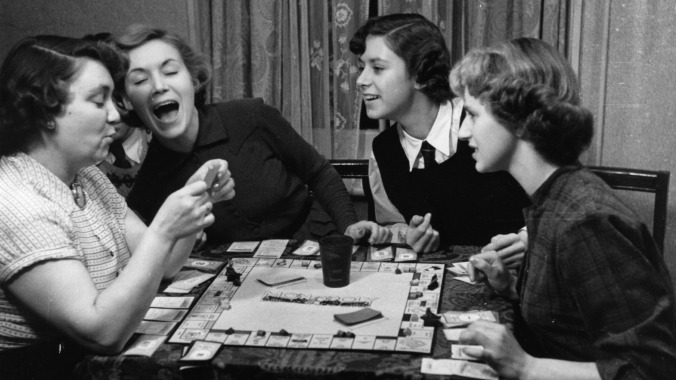5 new party games to liven up your holidays


Every Friday, A.V. Club staffers kick off our weekly open thread for the discussion of gaming plans and recent gaming glories, but of course, the real action is down in the comments, where we invite you to answer our eternal question: What Are You Playing This Weekend?
Holiday gatherings are filled with traditions like eating favorite foods, giving gifts, drinking excessively, and interrogating new significant others. Games are another tradition, providing something to do while the meal’s cooking or to extend the night after the plates have been cleared away. While you might not be able to persuade your family that you really don’t need to serve Jell-O this year, you can at least freshen up the competitive activities, ditching Cards Against Humanity or charades in favor of one of these new party games.
(May Cause) Side Effects
Games Adults Play’s (May Cause) Side Effects is a perfect icebreaker, since it’s designed to make everyone playing look absolutely ridiculous. Each team of two players gets a pile of five red and blue pills, each representing a restriction on how they move or speak. They take turns spending 40 seconds trying to get their partner to guess words printed on a deck of cards while under the influence of two of the side effects.
The side effects make the relatively simple task of getting your partner to guess words like “furniture” or “change” hilariously complicated. Adding in charades components is difficult if you need to spend the round flexing your muscles, and it can be hard to make out what your teammate is saying when they have three fingers shoved in their mouth. Some will cost you time, like needing to tell your partner to shush every time they speak, and it can be hard to get out guesses while laughing at the spectacle of someone running around the room flapping their arms like a bird while also talking like a belligerent drunk.
Other teams are encouraged to gently chastise players if they aren’t acting out their side effects satisfactorily, but this game is all about high-energy spectacle. Each correctly guessed word awards a point, which are tallied up once every team has taken five turns. That’s usually plenty of time to get everyone a little sweaty and hoarse and to forge the bonds that only come from sharing some particularly undignified behavior.
Tattoo Stories
A decidedly calmer experience, Bicycle’s Tattoo Stories has up to six players take on the role of rival tattoo artists trying to impress another player acting as the customer. The customer draws 10 cards featuring elements they could incorporate into a tattoo, like a board game or a mountain, and then chooses five of them for the other to players sketch on whiteboards. They have three minutes to produce something resembling a coherent design and are welcome to ask the customer questions like what kind of zombie they’d like inked on their body. At no point during the drawing process are you allowed to erase your work.
Once time is up, everyone pitches their design to the customer, explaining how they’ve integrated the various elements to please them. This keeps the game from just being a judge of who has artistic talent and also provides opportunities for sucking up and spinning bizarre tales about why the twins from The Shining are now zombies wearing jetpacks. The customer then awards each card to the person they think used it best, meaning multiple people are likely to feel like a winner each round, though a particularly good design can earn someone several points. The game ends once everyone has been a customer twice, though you can easily feel satisfied after one full round.
The Blockbuster Party Game
Big Potato Games’ The Blockbuster Party Game goes well beyond nostalgia value, delivering a brilliantly designed game that’s extremely entertaining to both watch and play. In the same vein as Trivial Pursuit, two teams compete to collect film cards representing eight genres. Each round kicks off with a head-to-head buzzer battle, with one player from each team facing off by alternating naming movies that fit a randomly chosen criterion like “based on a book” or “featuring Jennifer Lawrence.” Every time they name a new film, the player hit a buzzer, which sets a 15-second timer for their opponent. The first person who can’t come up with a fit during that time loses. Naming sequels isn’t allowed, so as soon as someone says Twilight for “vampire movies,” Breaking Dawn is no longer an option.
The winning player then gets to draw six movie cards and choose three for themselves and three for their opponent. Then they assign each of their cards to a category laid out on a game board that resembles a Blockbuster store parking lot: “one word,” “act it,” and “quote it.” The rest go to their opponent, who does the same with worse options. The first player has 30 seconds to get their teammates to guess the film in the chosen way, like saying “ape” for King Kong, “It’s all for you, Damien” for The Omen, or imitating a chestburster for Alien. If they manage to get all of their cards guessed in time, they can start stealing cards from their opponent.
This is obviously best played with people who like movies, though if you don’t know a quote from a given film, you’re welcome to make something up in the hopes your team will figure it out anyway. There’s some decent strategy when it comes to picking and placing movie cards, since you want to try to ensure you get all the categories you need while denying your opponents their victory. If you have four movie cards of the same genre, you can discard three to steal a card from the other team, which keeps the game from slowing to a crawl due to bad luck in drawing cards. That ability, combined with the chance to get bonus cards in a particularly good round, makes it surprisingly easy to come from behind so that the game feels competitive and entertaining throughout.
Everybody Knows
Another fast-paced show of knowledge, Endless Games’ Everybody Knows gives players 60 seconds to answer 10 fairly easy questions. These include basic trivia like naming the branches of the U.S. government, and things that would be found in Jeopardy!’s “Stupid Answers” category, like “Who is buried in Grant’s tomb?” While there are a few questions that will certainly stymie people who don’t know much about sports or kitchen implements, this is mostly a test of fast thinking under pressure and doing a little quick guessing to figure out what particular word is meant to be the answer to a prompt like “It could describe extreme, uncontrollable laughter.”
The editing could use some work on this one. Some cards had the same question printed on them twice, or too many things from the same category. Other times, the answers were just oddly phrased, like saying that Cinderella lost her shoe when running from the ball, rather than her glass slipper. Players should be prepared to cut their opponents some slack, letting them have the point if it was pretty clear they knew what the card was getting at. If you guess wrong or don’t know the answer to a question, you can pass and come back to it after answering the others. The person who earns the most points after five rounds wins. The nature of the questions means that scores are likely to be relatively close.
Codenames: Disney Family Edition
A licensed version of Vlaada Chvátil’s excellent spy game Codenames, Codenames: Disney Family Edition is perfect for gatherings with kids and adults who still want a challenge. Players split into two teams, each with a cluemaster tasked with getting their teammates to guess their designated treasure cards without guessing the cards that belong to their opponents. They do this by taking turns sharing a one-word clue and the number of cards that it applies to, like “Smirk 4.”
The fun and the difficulty come from the ways that players are guaranteed to misinterpret the clue. A picture of Robin Hood might have an obvious smirk on his face, but is the title character of The Good Dinosaur smirking, or just giving a goofy smile? Players end their turn whenever they make an incorrect guess, which could involve picking a “neutral” card, giving their opponents a point by picking one of theirs, or even picking the game-over square, which causes them to lose immediately.
The Disney branding may make the game more appealing to younger players, and the game has a variety of ways to tune the difficulty, like playing with fewer tiles for faster games, ditching the game-over square to place less pressure on younger players, or using words instead of pictures for an extra challenge for true Disney fanatics who know that Kevin is the name of the bird from Up. Like with traditional Codenames, the different configurations and the chance to switch between cluemaster and guesser makes the game easy to replay, and gives everyone at the table a sense for how the other people think.